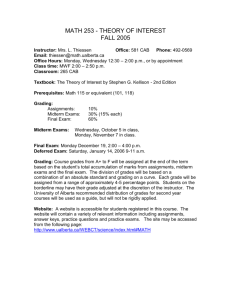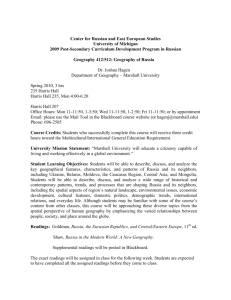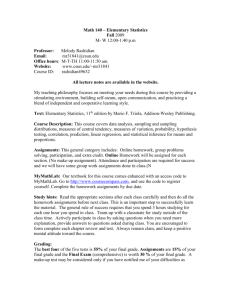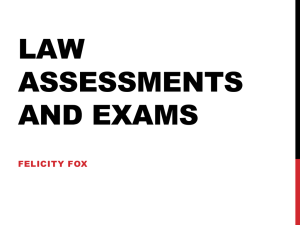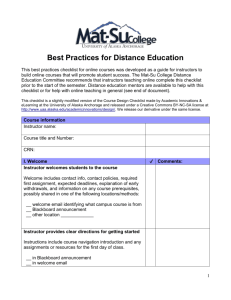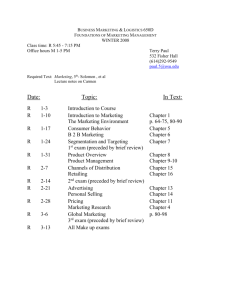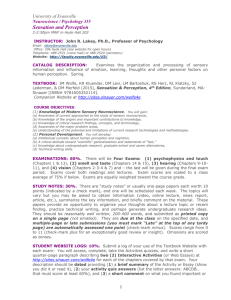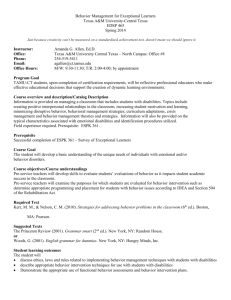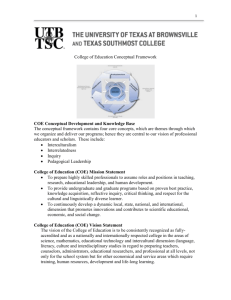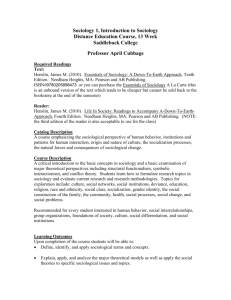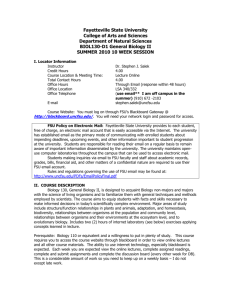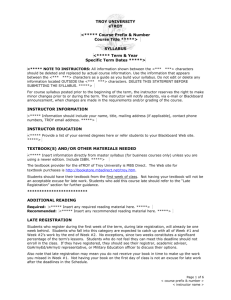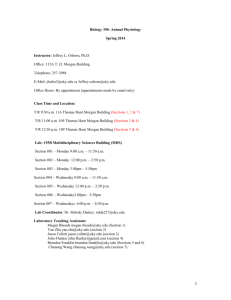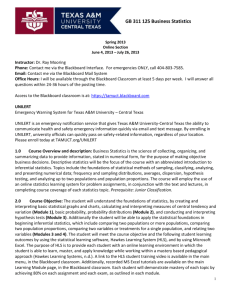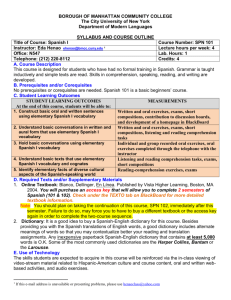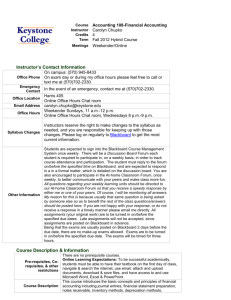CSD101E: Computer and Data Processing - MU BERT
advertisement
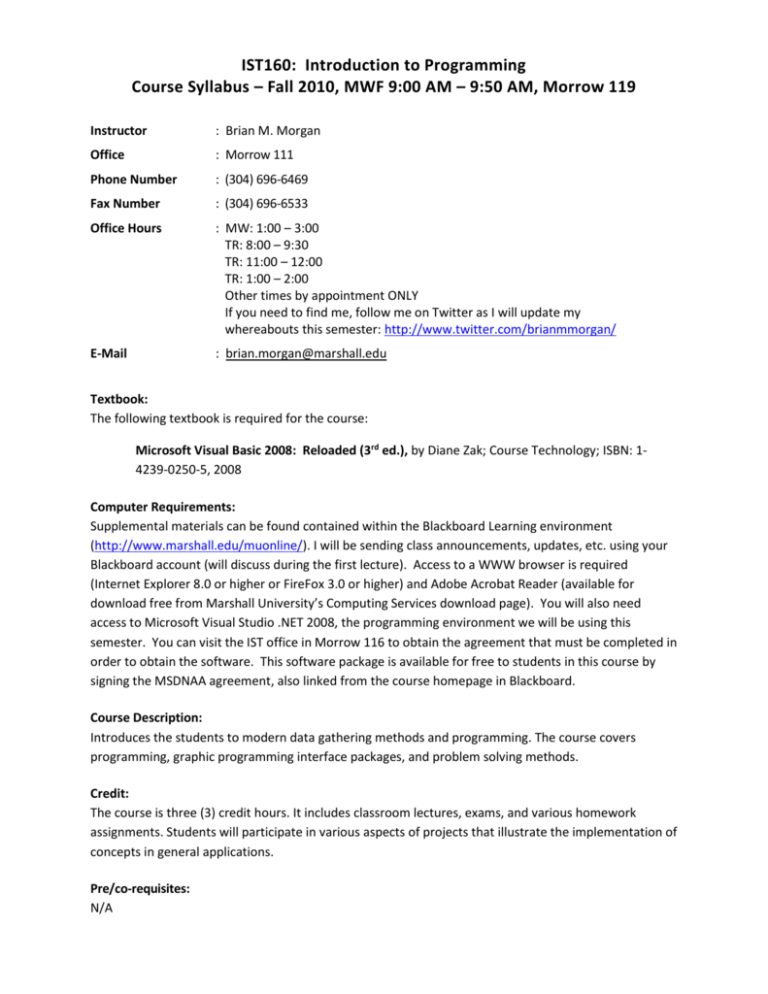
IST160: Introduction to Programming Course Syllabus – Fall 2010, MWF 9:00 AM – 9:50 AM, Morrow 119 Instructor : Brian M. Morgan Office : Morrow 111 Phone Number : (304) 696-6469 Fax Number : (304) 696-6533 Office Hours : MW: 1:00 – 3:00 TR: 8:00 – 9:30 TR: 11:00 – 12:00 TR: 1:00 – 2:00 Other times by appointment ONLY If you need to find me, follow me on Twitter as I will update my whereabouts this semester: http://www.twitter.com/brianmmorgan/ E-Mail : brian.morgan@marshall.edu Textbook: The following textbook is required for the course: Microsoft Visual Basic 2008: Reloaded (3rd ed.), by Diane Zak; Course Technology; ISBN: 14239-0250-5, 2008 Computer Requirements: Supplemental materials can be found contained within the Blackboard Learning environment (http://www.marshall.edu/muonline/). I will be sending class announcements, updates, etc. using your Blackboard account (will discuss during the first lecture). Access to a WWW browser is required (Internet Explorer 8.0 or higher or FireFox 3.0 or higher) and Adobe Acrobat Reader (available for download free from Marshall University’s Computing Services download page). You will also need access to Microsoft Visual Studio .NET 2008, the programming environment we will be using this semester. You can visit the IST office in Morrow 116 to obtain the agreement that must be completed in order to obtain the software. This software package is available for free to students in this course by signing the MSDNAA agreement, also linked from the course homepage in Blackboard. Course Description: Introduces the students to modern data gathering methods and programming. The course covers programming, graphic programming interface packages, and problem solving methods. Credit: The course is three (3) credit hours. It includes classroom lectures, exams, and various homework assignments. Students will participate in various aspects of projects that illustrate the implementation of concepts in general applications. Pre/co-requisites: N/A Desired Objectives/Outcomes: Students will learn to design and develop programs in Visual Basic 2008 using a clean, conceptual approach. Specific topic coverage includes: - An introduction to Visual Basic 2008 Creating a user interface Variables, constants, methods, and calculations Making decisions in a program Repeating program instructions Sub and function procedures Arrays Fundamentals of logic Instruction method: There will be 3 contact hours of classroom lecture per week. Projects covering major topics are part of the course. Students may work on their assignments/projects in University computing facilities or from home with an Internet connection and Visual Studio .NET 2008 installed on their PC. Evaluation method: Evaluation of student's performance will be based on the quality of your performance on homework assignments and exams. Grading Policy: 2 in-class Exams (equally weighted) 30% Final Exam 20% Visual Basic Homework Assignments/Projects (equally weighted) 50% Attendance 0% Assessment of Projects: The grading of all homework assignments and projects will take into account: 1. Although the most important attribute of a program is correctness, grading will take into consideration such items as time and coding efficiency, documentation, etc. 2. Programs must have proper inline documentation and must be properly indented. 20% will be deducted for poorly documented and/or poorly indented code. 3. All submitted code must compile correctly to receive at least partial credit. Code that does not compile will receive 0 credit, NO EXCEPTIONS. This means you must debug your code before submitting. 4. Although interactions with other students are encouraged, you must compose your own answers, unless otherwise noted. Individuals who utilize other people’s thoughts or ideas must provide appropriate references to said resources. Failure to provide such documentation will result in a failing grade for the assignment, and may result in a failing grade for the course. Final letter grades are determined based on the following grading scale: 90-100% A 80-89% B 70-79% C 60-69% D Below 60 F The instructor reserves the right to change these values depending on the overall class performance and/or extenuating circumstances. Policy Statement: My Academic Dishonesty Policy Academic Dishonesty is defined as any act of a dishonorable nature which gives the student engaged in it an unfair advantage over others engaged in the same or similar course of study and which, if known to the classroom instructor in such course of study, would be prohibited. Academic Dishonesty will not be tolerated as these actions are fundamentally opposed to "assuring the integrity of the curriculum through the maintenance of rigorous standards and high expectations for student learning and performance" as described in Marshall University's Statement of Philosophy. If you are found cheating on projects or plagiarizing answers from the Internet or other sources (among other things), there will be no second chance. Your penalty is that you will receive a failing grade for the course. In those cases in which the offense is particularly flagrant or where there are other aggravating circumstances, additional, non-academic, sanctions may be pursued through the Office of Judicial Affairs. Notice of an act of academic dishonesty will be reported to the Department Chair, Dean of the College of Science, and to the Office of Academic Affairs. Please refer to the Marshall University Undergraduate Catalog for a full definition of academic dishonesty. Assignments: The course includes a number of assignments/projects. All assignments are due BY THE BEGINNING OF CLASS on their due date and must be submitted through the Blackboard Assignments tool. NO LATE ASSIGNMENTS WILL BE ACCEPTED. Please do not procrastinate in working on your assignments or trying to submit through Blackboard at the last possible moment as many others have done in the past. If you wait until the last night to start on the project or the last minute to try to submit, chances are, you will fail. Exams: There are THREE exams worth 50% of your overall grade. The first will come after Chapter 3, the second after Chapter 7, and a comprehensive Final exam (as scheduled). Exact dates and times of exams will be announced in class. Make-up Exams and Late Penalty: Make-up exams will not be given except under unusual circumstances and satisfactory written justification. Any student who misses an exam due to an unexcused absence will receive a grade of zero for that exam with no opportunity for make-up or substitution. University excused absences or those occurring with a good reason (and that reason must be given prior to missing the exam – call and leave a message if you have to) will be excused. Make up exams must be taken within one week of the original scheduled date. The decision whether to give a make-up exam rests with the instructor. Attendance Statement: As with previous semesters, I am NOT making class attendance mandatory. However, I will keep a record of who is attending and who is not. If you miss class, it is your responsibility to catch up on material missed, and it will not be my responsibility to catch you up on material missed during office hours, or re-lecture to you. Withdrawal Policy: The University withdrawal policy is followed in this course. The last day to drop an individual course for the Fall Semester is October 29, 2010. University Holidays: The class is officially dismissed on the following dates: Labor Day September 6, 2010 Fall Break/Thanksgiving November 22, 2010 November 24, 2010 November 26, 2010 Topics and Methodology: The following outline delineates the tentative class schedule with topics to be addressed during the course. Please note this is a tentative schedule and it may change upon class progress: August 23 Overview of course and syllabus, introduction to Blackboard August 25 Chapter 1 August 27 Chapter 1 August 30 Chapter 2 September 1 Chapter 2 September 3 Chapter 2 September 8 Chapter 3 September 10 Chapter 3 September 13 Chapter 3 September 15 Chapter 3 Project 1 Due – Chapter 2, Case Project on page 120 - Sophia's Italian Deli (do entire project). Be sure to use group boxes and panels appropriately, separating the types of dishes served in to categories September 17 Chapter 3 Review for Exam 1 September 20 Exam 1 September 22 Chapter 4 September 24 Chapter 4 September 27 Chapter 4 Project 2 Due – Chapter 3, Computer Exercises on pages 179-180, #8 September 29 Chapter 4 October 1 Chapter 4 October 4 NO CLASS – Away at a conference October 6 Chapter 5 October 8 Chapter 5 October 11 Chapter 5 Project 3 Due – Chapter 4, Computer Exercises on page 229, #8 and Chapter 4, Case Project on page 232 - Novelty Warehouse October 13 Chapter 5 October 15 Chapter 6 October 18 Chapter 6 October 20 Chapter 6 October 22 Chapter 6 Project 4 Due – Chapter 5, Computer Exercises on page 279, #6 and Chapter 5, Case Project on page 281 - Johnson Supply October 25 Chapter 7 October 27 Chapter 7 October 29 Chapter 7 November 1 Chapter 7 Project 5 Due – Chapter 6, Computer Exercises on pages 334-335, #6 and Chapter 6, Computer Exercises on page 336, #9 November 3 Chapter 7 Review for Exam 2 November 5 Exam 2 November 8 Chapter 8 November 10 Chapter 8 Project 6 Due – Chapter 7, Case Project on pages 407-408 - Jacobson Finance November 12 Chapter 8 November 15 Chapter 8 November 17 Chapter 9 November 19 Chapter 9 November 29 Chapter 9 December 1 Chapter 9 Project 7 Due – Chapter 8, Case Project on page 468 - Cable Direct (HINT: Function for each type of customer, sub to clear the interface upon changes) December 3 Tomato Day – Catch-up (Dead Week) December 6 Dead Week – Receive take home final December 14 Final Exam Due 8:00 am For each topic discussed in the textbook, specific experiences of other students and the instructor will be discussed to enhance the characteristics involved. Hands-on projects for the course will be based on either real-world or fictitious needs. Additional material may also be covered in the class. Every student is responsible for all material presented in class, including lectures, notes, and handouts. In case you are not present for a class, it is your responsibility to contact the instructor and receive information about the material presented in that class. Class attendance is very important. Effort Required: As a 100-level course, this course is provided as an introductory course, but there will still be a considerable amount of development and research effort required of the student. For every one hour in class, the student is expected to put in an effort of at least three hours outside the class for studying and programming. Because of background and preparedness, some students may have to put in additional effort. PLEASE DO NOT PROCRASTINATE. Procrastination and the placing of blame on other factors than yourself has become a very large problem. Prioritize, schedule, and take responsibility for your actions and you should do very well in this class. Communication: The Discussions and Mail tools within Blackboard will be used to make any general announcements, last minute changes, etc. It is mandatory that you monitor your Blackboard course messages at least once a day. Note about cell phones in class: In compliance with Marshall University’s cell phone policy, please set your cell phone ringer to "Vibrate Only" mode (or turn it off) before you enter the classroom. If I hear it ring in class, I get to answer it -> no exceptions.


